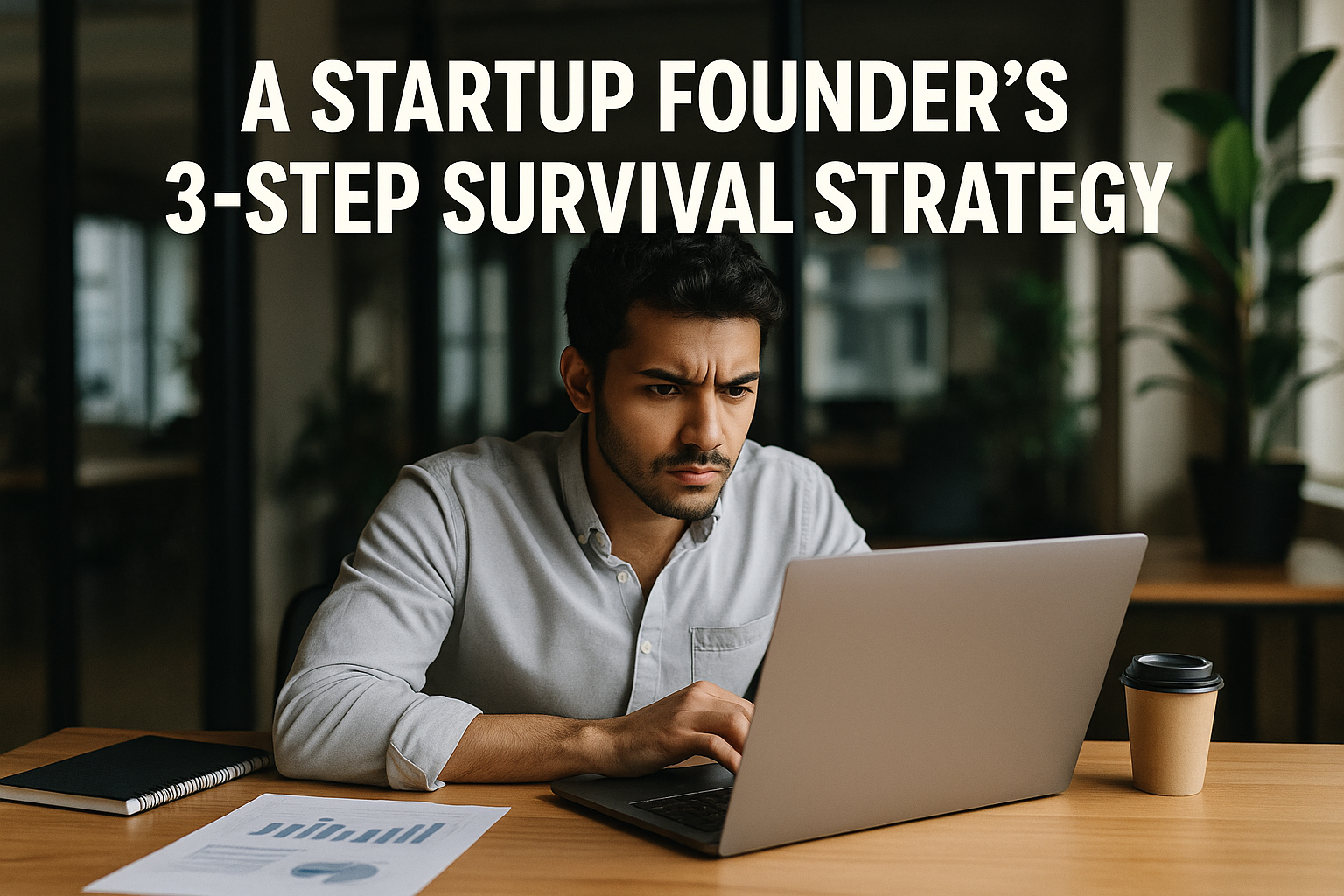Starting your own Startup is often seen as a glamorous leap toward freedom and innovation. But behind the glossy headlines and unicorn valuations lies a much harsher truth: for many founders, the early days mean living on little, or nothing. It’s a time when your belief in the mission must outweigh the pressure of empty bank accounts and unpaid bills.
This stage can either break you or shape you. The key to surviving, and thriving, through it is a combination of self-discipline, smart decision-making, and grit. Here’s a practical 3-step framework that struggling founders can use to power through the toughest financial moments.
Why Most Founders Earn Little (or Nothing) at First
Let’s face the facts: earning little in the early days isn’t a fluke; it’s the norm. Here’s why:
- Self-Funding Comes First: Many startups begin without outside capital. Founders pour in their own savings and often skip salaries altogether to keep the business alive.
- Revenue Goes Back In: What little money comes in usually gets reinvested into growth, think hiring, marketing, or tech, not the founder’s paycheck.
- Income Streams Are Unstable: Early-stage revenue is inconsistent at best. You can’t plan for a salary when your income is unpredictable.
- Investor Perception Matters: Many investors expect founders to make sacrifices, including living lean, to show commitment.
- Profitability Takes Time: For most startups, it takes years to generate stable profits, during which personal income remains low.
Instead of pretending this doesn’t exist, the smart move is to prepare for it. That’s where this 3-step plan comes in.
Step 1: Get Ruthless About Personal Finances

Before worrying about your startup’s finances, you need to take control of your own. This doesn’t just mean “budgeting”. It means adopting a lean lifestyle with intention.
Practical Tactics:
- Track Every Expense: Log every purchase for 30 days. Use an app or a spreadsheet. You’ll be amazed at what adds up.
- Split Needs from Wants: Essentials like rent, groceries, and bills stay. Cut out the rest:- Netflix, takeout, shopping sprees, etc.
- Cut Big Costs First:
- Housing: Consider a roommate, move to a cheaper neighborhood, or even stay with family temporarily.
- Food: Cook at home. Buy in bulk. Meal prep. Skip eating out.
- Transport: Use public transport, cycle, or walk if possible.
- Reduce or Refinance Debt: Prioritize paying off high-interest loans. If possible, consolidate debt to reduce interest.
- Create a Survival Fund: Save enough to cover 6–12 months of lean living. Even if you add small amounts regularly, it adds up.
- Separate Business & Personal Money: Open separate bank accounts. Don’t mix your startup’s money with your personal finances.
“I lived with my parents and ate cheap meals for almost two years. It wasn’t fun, but it gave me room to build.” – Early-Stage Founder
Step 2: Build Income Streams Without Abandoning Your Startup

You don’t have to starve while building your dream. There are ways to generate income on the side without giving up your main mission.
Smart Ways to Earn:
- Use Weekends Creatively: Instead of watching shows or scrolling endlessly, work on side projects:- write, design, code, or sell.
- Freelance Your Skills: Offer what you’re good at, writing, development, design, consulting. Sites like Upwork or Fiverr can help you start.
- Build Your Brand: Launch a blog, podcast, or YouTube channel around your niche. It builds authority and can eventually bring in money.
- Make a Simple Product: Think eBooks, digital templates, or niche tools. These can generate passive or semi-passive income.
- Monetize Your Hobbies: Baking, photography, crafting;- if you enjoy something and can offer it, there may be a market.
- Barter Services: Trade your skills for things your startup needs:- legal help, design work, or accounting. It saves cash and builds relationships.
“I picked up freelance coding work on nights and weekends. It paid my rent and helped me meet clients I later worked with full-time.” – Startup CEO
Step 3: Build a Financial Buffer (a.k.a. Your Freedom Fund)
A financial cushion isn’t just for emergencies, it’s a tool that lets you iterate and survive longer. The more you save, the more time you buy to keep improving your startup.
How to Grow It:

- Automate Your Savings: Set up automatic transfers, even small ones, to a separate account. Don’t touch it unless necessary.
- Think Long-Term, Not Just Safe: Don’t rely only on traditional low-return savings. Understand inflation, and look for better ways to grow your money.
- Reinvest Wisely: When your business does earn, don’t jump to raise your salary. Reinvest in areas that fuel growth—product, team, or user acquisition.
- Explore External Funding (Cautiously):
- Bootstrapping: Remain independent for as long as you can.
- Family & Friends: Only if they understand the risk. Be clear and put agreements in writing.
- Grants & Accelerators: These can offer non-equity cash and mentorship.
- Angel Investors: Approach only if you have traction and a clear growth path.
- Avoid High-Cost Loans: Credit cards and personal loans can bury you in debt. Only use them with a repayment plan and clear limits.
“Each small saving was like adding a day to my runway. It gave me space to focus and breathe.” – Tech Founder
Strengthen Your Mindset
Money challenges bring mental stress. Managing that pressure is just as crucial as managing your finances.
Key Mindset Shifts:

- Frugality = Strength: Living lean is a superpower. It builds focus, resilience, and clarity.
- Optimism with a Plan: Stay hopeful, but ground it in action. Keep solving, keep moving forward.
- Lean on Others: Connect with fellow founders, mentors, or communities. You’re not alone.
- Take Care of Yourself: Get enough sleep. Eat decently. Move your body. Mental burnout ruins startups.
- Keep Learning: Podcasts, books, newsletters, absorb knowledge daily. The more you know, the more flexible and creative you become.
Building a startup with low or no personal income is one of the toughest challenges an entrepreneur can face. But it’s also a rite of passage. With a clear strategy, cutting costs, earning creatively, and building a survival fund, you give yourself the best chance not just to endure, but to succeed.
Every penny saved, every smart gig picked up, every late-night learning session, it all adds up. The early struggle is real, but so is the long-term reward. Be lean. Be smart. Be relentless.
If you found this information helpful, don’t forget to subscribe to Zealimpact.com. We’ll keep bringing you more Jobs and career-related Blogs like this one. Your support is our strength.
If you found this information useful, don’t forget to share it with your friends and family.





















